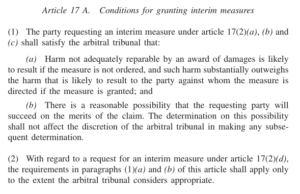In recent years, arbitration has become the preferred method of resolving M&A disputes. While the global market shows steady signs of recovery, arbitration is considered an effective means to resolve disputes involving M&A transactions in a wide range of sectors, such as the financial, healthcare, education, energy and technology sectors.[1] Disputes in M&A Transactions M&A […]
News
Security for Claims in International Arbitration – Preble-Rish Haiti v. BMPAD
In international arbitration, security for claims, also called security for payment,[1] belongs to a category of interim or provisional measures that can be sought prior to the issuance of the final award. If granted by the arbitral tribunal, it consists in “a kind of advance payment designated to guarantee the payment and/or enforcement of the […]
Electronic Arbitration Agreements: Admissibility and Enforceability
The volume of cross-border commercial transactions conducted electronically is growing inexorably from year to year. Companies around the world are also increasingly using new electronic contracting tools. Many legal questions have arisen against the background of this paperless process concerning the enforceability of electronically-signed documents. The same issue arises in relation to the arbitration agreement. […]
Revision of Arbitration Awards under French Law
Under French law, pursuant to the doctrine of functus officio, once the arbitral tribunal has rendered its award, it cannot re-examine it.[1] There is no possibility for the French courts to remit the matter to the arbitral tribunal in case an award is annulled. Accordingly, the parties can only start new arbitration proceedings on the […]
Vienna International Arbitral Center (VIAC)
The Vienna International Arbitral Center (the “VIAC”) has continued to develop and reaffirm its position as a leading arbitration institution in Europe, and namely in the region of Central and Eastern Europe, with more than 1,600 proceedings administered since its establishment in 1975 under the auspices of the Austrian Federal Economic Chamber.[1] Today, the VIAC […]
Beijing Arbitration Commission / Beijing International Arbitration Center
The Beijing Arbitration Commission, also known as the Beijing International Arbitration Center (the “BAC” / “BIAC“) is an independent, non-profit organization based in Beijing, China, offering services in the fields of arbitration, mediation and other dispute resolution mechanisms. The Beijing Arbitration Commission was established in 1995, following the promulgation of the Arbitration Law of the […]
Arbitration Boutique Aceris Law Wins Trophy for Best Swiss Law Firm
The international arbitration boutique Aceris Law has won another trophy for its legal work. It was awarded a Silver Trophy in the category of Best Law Firm in Switzerland during the 2021 Leaders’ League Trophy Ceremony organized by Décideurs Magazine. The prestigious Trophées du Droit (Trophies of Law) recognise the excellence of legal specialists in […]
Provisional Measures in International Arbitration
Provisional measures can be an effective instrument to protect parties’ rights in arbitration. Although there is no widely accepted definition, provisional measures are, in general terms, remedies or relief whose purpose is to safeguard parties’ rights. In international arbitration, institutional rules are generally silent as to the standards and principles for the granting of provisional […]
The Status of Permanent Arbitral Institutions in Russia
Before 2016, there were concerns about the effectiveness of arbitration in Russia. Russian companies could sue in any arbitration court abroad and, as a rule, all corporate disputes could be resolved by foreign arbitral tribunals. This situation was not without pitfalls, however, as the resulting decision then had to be approved by a Russian court. […]







